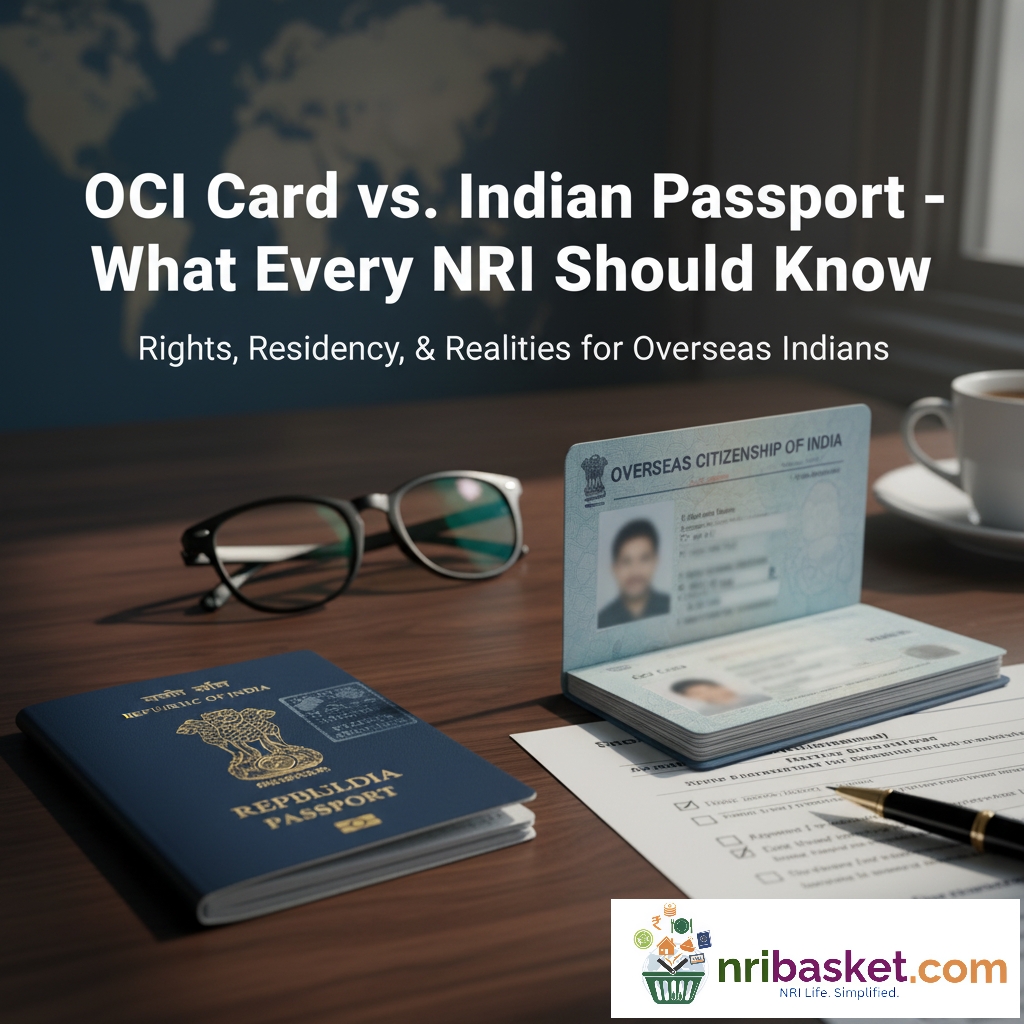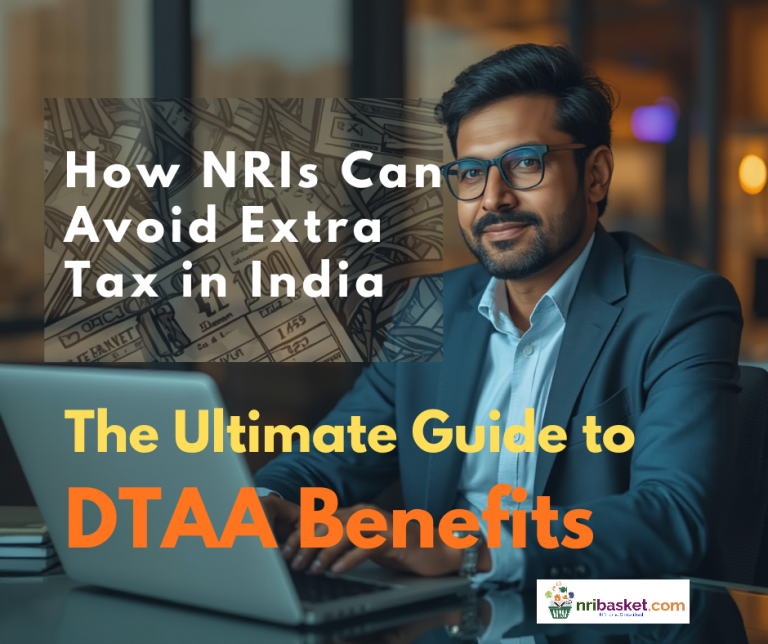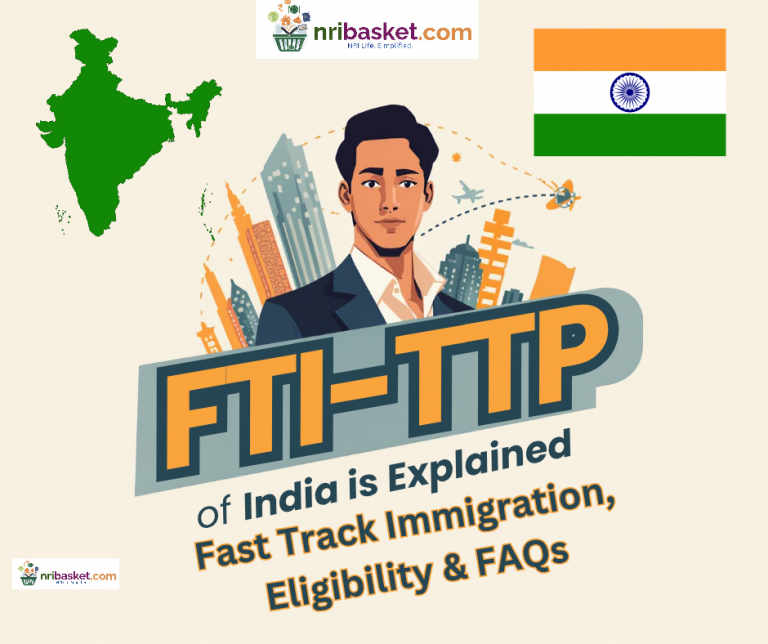
Oci card vs indian passport nri guide
Introduction
For millions of Non-Resident Indians (NRIs), the question of how to maintain a strong connection to India often boils down to a critical choice: the Indian Passport (and the status of an NRI) versus the Overseas Citizenship of India (OCI) Card. While both grant significant ties to the homeland, they represent fundamentally different legal statuses with distinct rights, restrictions, and long-term implications. The decision hinges on whether you value full Indian citizenship (which requires surrendering your foreign passport) or prefer permanent residency benefits alongside your foreign nationality. This guide provides a clear, side-by-side comparison of the Indian Passport and the OCI Card, covering everything from political rights and property ownership to banking and travel rules, helping every NRI understand the legal realities of their status.
OCI Card vs. Indian Passport: Confused about your NRI status? Compare OCI Card benefits (lifelong visa, residency, property rights) with the full citizenship rights of an Indian Passport. Understand restrictions on voting, land ownership, and re-issuance rules for a clear choice.
long answer: A holder of an Indian Passport is a full citizen of India with all constitutional rights. An OCI Cardholder is a foreign national of Indian origin who has been granted an Overseas Citizenship of India status, which is a form of permanent residency offering many rights similar to Non-Resident Indians (NRIs), but is not full citizenship.
long answer: OCI status does not confer any political rights, including the right to vote in Lok Sabha, Rajya Sabha, or State Legislative Assembly elections. OCI Cardholders are foreign nationals and are excluded from political participation.
long answer: The Constitution of India does not permit dual citizenship. An Indian citizen who voluntarily acquires foreign citizenship must surrender their Indian passport, and only then may they apply for OCI status (if eligible).
long answer: OCI Cardholders are granted a lifelong visa benefit. The OCI Card itself, along with a valid foreign passport, serves as the valid travel document for entering and exiting India, exempting the holder from requiring a separate visa.
long answer: Unlike other foreign nationals who require specific work or residence visas, OCI Cardholders are granted permanent residency and can reside, work, and conduct business in India for an indefinite period.
long answer: A significant benefit of the OCI Card is the exemption from registering with the Foreigners Regional Registration Officer (FRRO) or Foreigners Registration Officer (FRO), regardless of the duration of their stay in India.
long answer: OCI Cardholders have general parity with NRIs in economic and financial fields, but they are specifically prohibited from purchasing agricultural land, plantation property, or farmhouses in India. They can, however, inherit such properties from a Resident Indian.
long answer: OCI Cardholders are allowed to purchase and own residential and commercial properties in India, similar to Non-Resident Indians. The restriction applies only to agricultural and plantation land.
long answer: OCI Cardholders are specifically not entitled to the rights conferred under Article 16 of the Constitution, which guarantees equality of opportunity in matters of public employment. They cannot hold constitutional posts or most government employment positions.
long answer: Although OCI stands for Overseas Citizenship of India, it is a designation of permanent residency and special travel/stay benefits, and not full citizenship. India does not recognize or permit dual citizenship.
long answer: Eligibility includes a foreign national who was a citizen of India on or after 26.01.1950, was eligible to become a citizen of India on 26.01.1950, or belongs to a territory that became part of India after 15.08.1947, and their children/grandchildren/great-grandchildren, as well as foreign spouses of Indian citizens or OCI Cardholders (with a valid, subsisting marriage for at least two years).
long answer: A foreign national is not eligible for an OCI Card if they, their parents, or grandparents have ever been a citizen of Pakistan or Bangladesh.
long answer: The OCI Card must be re-issued only once when a new passport is obtained after completing 20 years of age, and once after completing 50 years of age. For ages 21 to 50, re-issuance is optional but the holder must upload a copy of the new passport and photo online.
long answer: NRIs (Indian Passport holders residing abroad) and OCI Cardholders are both classified as persons of Indian origin (PIO) for opening NRE (Non-Resident External) and NRO (Non-Resident Ordinary) bank accounts, providing them with similar financial and investment opportunities.
long answer: An OCI Cardholder must always travel with their valid foreign passport and the OCI Card (the blue-grey booklet). They are no longer required to carry the old passport bearing the “U” visa sticker.
long answer: The OCI status explicitly bars the holder from holding any Constitutional office in India, such as that of the President, Vice President, Judge of the Supreme Court, or Judge of a High Court.
long answer: An OCI Cardholder who has attained full age (18 years) is eligible to apply for Indian citizenship under Section 5(1)(g) of The Citizenship Act, 1955, provided they have been registered as an OCI for five years and have been ordinarily resident in India for twelve months immediately before making the application.
long answer: OCI Cardholders are typically required to obtain special permission from the Government of India (Ministry of Home Affairs) to undertake certain activities like missionary work, mountaineering, or journalism.
long answer: The OCI scheme grants general parity with Non-Resident Indians in respect of all facilities available to them in the economic, financial, and educational fields, except for the right to acquire agricultural or plantation properties.
long answer: The OCI Card itself is considered a ‘life-long’ document (subject to re-issuance rules), but it is only valid for travel when presented along with a valid foreign passport. An expired foreign passport cannot be used for entry or exit.
long answer: The tax liability of an OCI Cardholder in India is determined by their ‘Residential Status’ as per the Income Tax Act (based on the number of days they spend in India), not solely by their OCI status. If they reside in India long enough, they will be treated as a Resident for tax purposes.
long answer: An individual can apply to re-acquire Indian citizenship, but this requires renouncing their OCI status and foreign citizenship, and meeting the conditions for naturalization or registration as prescribed in the Citizenship Act.
long answer: The PIO card scheme was merged with the OCI card scheme in 2015. OCI status provides greater benefits, such as a life-long visa and exemption from FRRO registration for any length of stay, which were not available to PIO cardholders. All valid PIO cards are deemed to be OCI Cards.
long answer: If an OCI Cardholder acquires the nationality of a different country (other than Pakistan or Bangladesh), the OCI card itself does not need to be re-issued, but the holder must update the new nationality/passport details through the OCI miscellaneous services portal.
long answer: Similar to other foreign nationals, OCI Cardholders are required to obtain a Protected Area Permit (PAP) or Restricted Area Permit (RAP) to visit any place that falls within a Protected/Restricted Area notified by the Government of India.
long answer: Registered Overseas Citizens of India are entitled to parity with Non-Resident Indians (NRIs) in the matter of inter-country adoption of Indian children, streamlining the process for eligible OCI applicants.
long answer: The OCI scheme is explicitly not available to anyone who is or has ever been a citizen of Pakistan or Bangladesh, or a child, grandchild, or great-grandchild of such a person.
long answer: The Central Government may cancel OCI registration if it was obtained by fraud, false representation, or concealment of material facts, or if the OCI Cardholder shows disaffection towards the Constitution of India, or has engaged in war-time trade with an enemy.
long answer: Registered Overseas Citizens of India are entitled to parity with resident Indian nationals in the matter of tariffs for domestic air travel within India’s internal sectors, often allowing them to avoid higher foreign national fares.
long answer: The life-long visa and exemption from FRRO/FRO registration for long stays greatly simplifies the logistics for OCI Cardholders undertaking long-term research or higher studies in India. They also have parity with NRIs in educational fields.
long answer: For OCI Cardholders under the age of 20, the OCI Card must be re-issued every time a new passport is obtained due to changes in appearance and bio-metrics, ensuring that the OCI Card’s photo matches the current foreign passport.
long answer: A foreign spouse of an OCI Cardholder (or of a citizen of India) is eligible for OCI status, provided their marriage has been duly registered and has continuously subsisted for a minimum period of two years immediately preceding the date of application.
long answer: OCI Cardholders are treated on par with NRIs regarding most financial and investment instruments, which means they do not typically need prior approval from the Reserve Bank of India (RBI) for transactions like purchasing shares or commercial properties.
long answer: Upon acquiring foreign citizenship, an Indian citizen must surrender their Indian passport as India does not permit dual citizenship. The OCI Card is the subsequent option they can pursue to gain life-long visa benefits and permanent residency in India, but it is not mandatory.
long answer: A key parity benefit granted to OCI Cardholders is that they are charged the same entry fee as resident Indian citizens when visiting India’s national parks and wildlife sanctuaries, unlike other foreign nationals who pay higher tariffs.





